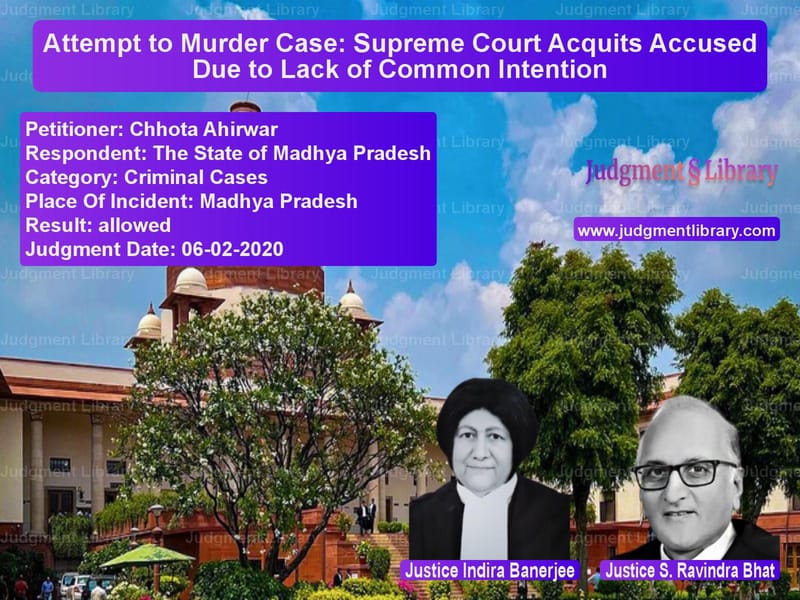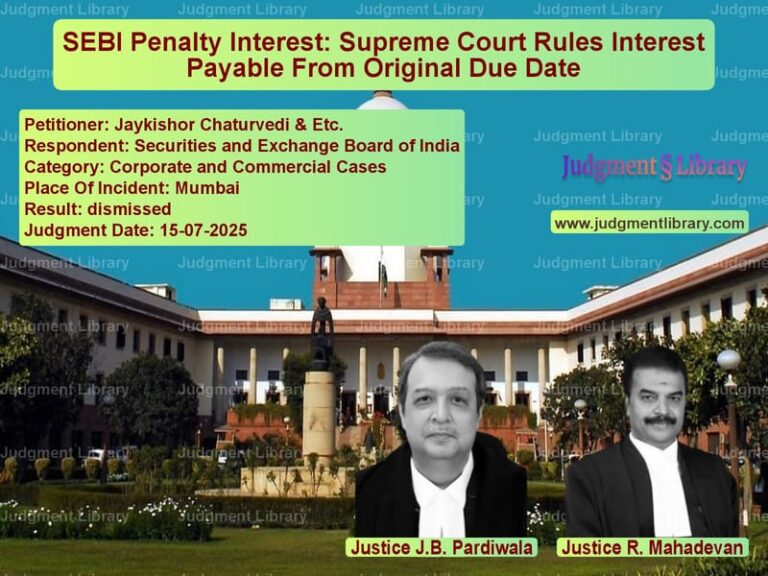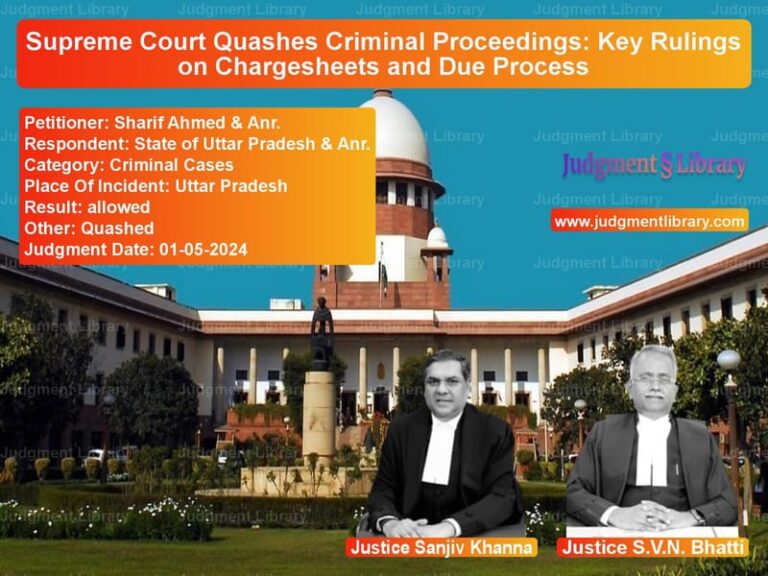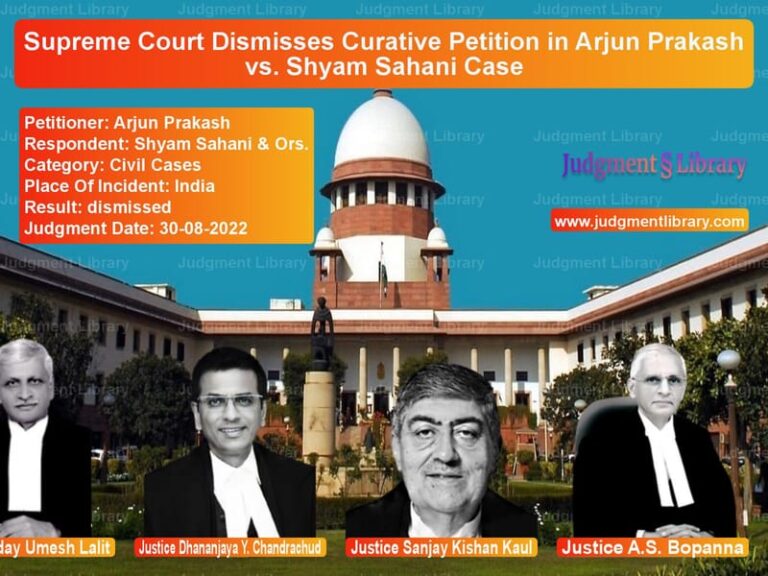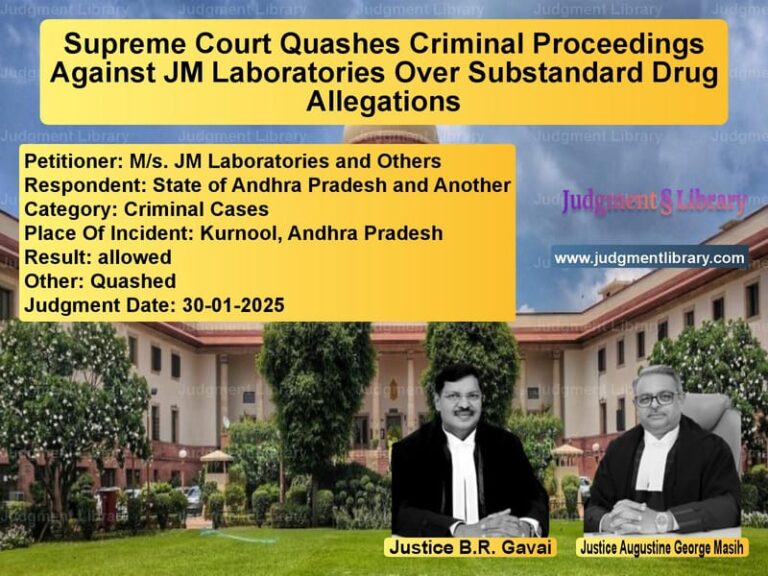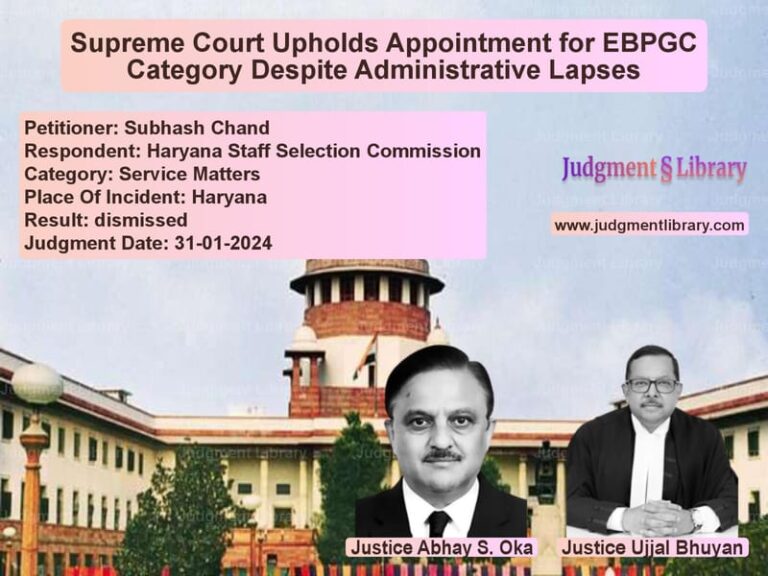Attempt to Murder Case: Supreme Court Acquits Accused Due to Lack of Common Intention
The case of Chhota Ahirwar vs. The State of Madhya Pradesh is a landmark judgment on the application of Section 307 read with Section 34 of the Indian Penal Code (IPC). This case involved an alleged attempt to murder, where the Supreme Court overturned the convictions of the accused, ruling that there was no common intention between the accused and the principal offender. The case underscores the necessity of proving intent beyond a reasonable doubt, particularly when invoking joint liability under Section 34 IPC.
Background of the Case
The case dates back to October 22, 1992, when a dispute over land escalated into an altercation between the complainant and the accused, Chhota Ahirwar. According to the prosecution, the altercation led to another accused, Khilai, pulling out a country-made pistol and firing at the complainant, injuring him. It was alleged that Chhota Ahirwar instigated Khilai to fire the shot, thereby making him equally liable under Section 34 IPC.
The accused were tried before the Additional Sessions Judge, District Panna, Madhya Pradesh, and convicted under Section 307/34 IPC. Chhota Ahirwar was sentenced to five years of rigorous imprisonment and fined Rs. 1000. On appeal, the High Court of Madhya Pradesh upheld the conviction. The case then reached the Supreme Court, where the primary question was whether the accused had a common intention with the principal offender to commit the offense.
Arguments of the Petitioner (Chhota Ahirwar)
- The petitioner argued that there was no evidence proving his premeditated involvement in the firing incident.
- He contended that he neither carried a weapon nor directly participated in the shooting.
- He further argued that at best, he had an altercation with the complainant, but it did not amount to an attempt to murder.
- He pointed out contradictions in the prosecution’s version, particularly discrepancies between the eyewitness testimonies.
Arguments of the Respondent (State of Madhya Pradesh)
- The prosecution argued that Chhota Ahirwar had instigated the principal accused, Khilai, to fire at the complainant.
- They contended that since he had actively participated in the altercation and provoked the attack, he shared a common intention with the principal accused.
- They relied on the testimony of prosecution witnesses who stated that Chhota Ahirwar had urged Khilai to shoot.
Supreme Court’s Judgment
A bench comprising Justice Indira Banerjee and Justice S. Ravindra Bhat examined the case and found no evidence to support the prosecution’s claim that Chhota Ahirwar had a common intention to kill the complainant. The Court ruled:
“The prosecution has miserably failed to establish any common, premeditated, or prearranged intention jointly of the accused appellant and the main accused Khilai to kill the complainant, on the spot or otherwise.”
The Court noted that the altercation was spontaneous and that Khilai had drawn the weapon and fired on his own. The alleged instigation by Chhota Ahirwar was not recorded in the complainant’s initial statement to the police, further weakening the prosecution’s case.
Analysis of Section 34 IPC
The Supreme Court reiterated that for Section 34 IPC to apply, there must be:
- A shared common intention among all accused persons.
- Active participation by all accused in furtherance of that intention.
- Clear evidence demonstrating that the accused acted in concert.
The Court stated that mere presence or participation in an altercation does not automatically imply common intention. In this case, the prosecution failed to prove that Chhota Ahirwar had a prearranged plan to commit the crime.
Key Observations of the Court
- “Mere participation in a crime with others is not sufficient to attribute common intention.”
- “Common intention can only be inferred from proved facts and circumstances.”
- “There is no evidence to establish any pre-arrangement to converge at the place of occurrence.”
The Court concluded that the conviction was based on assumptions rather than concrete evidence. It set aside the conviction of Chhota Ahirwar and directed his immediate release.
Impact of the Judgment
This judgment is a significant precedent in cases involving joint liability under Section 34 IPC. It clarifies that:
- Every person involved in an altercation cannot be held equally liable unless there is clear proof of shared intent.
- The burden of proving common intention rests on the prosecution and must be established beyond a reasonable doubt.
- Mere verbal altercations or presence at the crime scene do not automatically translate to criminal liability.
Conclusion
The Supreme Court’s decision in Chhota Ahirwar vs. The State of Madhya Pradesh serves as an important reminder that criminal liability under Section 34 IPC requires clear and unambiguous evidence of common intention. The ruling emphasizes that courts must exercise caution before convicting individuals based on joint liability, ensuring that each accused’s role is scrutinized independently.
Petitioner Name: Chhota Ahirwar.Respondent Name: The State of Madhya Pradesh.Judgment By: Justice Indira Banerjee, Justice S. Ravindra Bhat.Place Of Incident: Madhya Pradesh.Judgment Date: 06-02-2020.
Don’t miss out on the full details! Download the complete judgment in PDF format below and gain valuable insights instantly!
Download Judgment: Chhota Ahirwar vs The State of Madhya Supreme Court of India Judgment Dated 06-02-2020.pdf
Direct Downlaod Judgment: Direct downlaod this Judgment
See all petitions in Attempt to Murder Cases
See all petitions in Bail and Anticipatory Bail
See all petitions in Fraud and Forgery
See all petitions in Extortion and Blackmail
See all petitions in Judgment by Indira Banerjee
See all petitions in Judgment by S Ravindra Bhat
See all petitions in allowed
See all petitions in supreme court of India judgments February 2020
See all petitions in 2020 judgments
See all posts in Criminal Cases Category
See all allowed petitions in Criminal Cases Category
See all Dismissed petitions in Criminal Cases Category
See all partially allowed petitions in Criminal Cases Category

